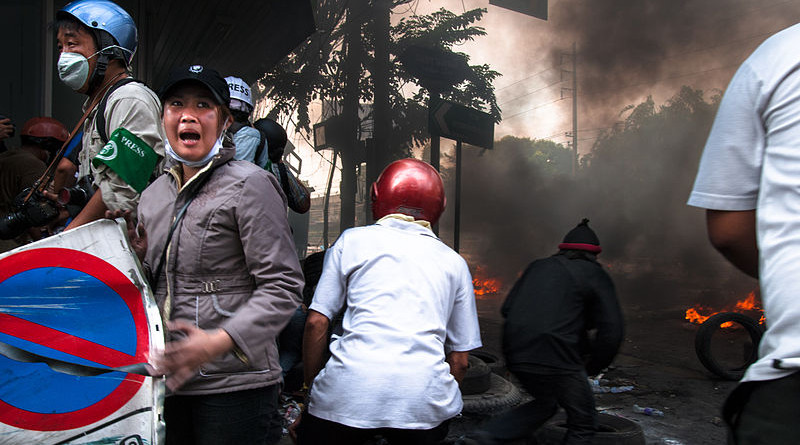Still Waiting For Justice 10 Years After The Bangkok Massacre – OpEd
In late April and early May of 2010, I found myself on the streets of Bangkok behind the barricades among the Red Shirt protest movement, which had captured the world’s attention with their 66-day long rally occupying a central area of the capital.
I had been sent there by my client, the former Prime Minister Thaksin Shinawatra, who had engaged our law firm to provide legal assistance to the United Front for Democracy against Dictatorship (UDD) and to try to help find a solution to the impasse, as the country was currently under an illegitimate government that had been forced into place via rigged court rulings to invalidate the democratic majority.
During those crucial weeks, events were quickly slipping out of control. The memories of the fatigue-inducing heat, the acrid smoke from the fires, and the gunshots ringing out all night remain visceral to me. I was just a few blocks away on the street when a sniper assassinated one Red Shirt leader, Seh Daeng, with a shot to the head while was he was literally doing an interview with a New York Times reporter. They brutally executed the Reuters photojournalist Fabio Polenghi. They were killing unarmed children, nurses, and even passersby seeking refuge at temples. We presented a very clear and frankly desperate offer to the government to avoid bloodshed, promising an immediate end to the protests in exchange for fresh elections – an offer which was ignored and silenced. The message was clear – their goal wasn’t to clear the rally, it was to violently crush the movement and terrorize the Thai people into submission.
The final sweep concluded on May 19, as men in black uniforms took sniper positions on the elevated BTS train lines and tanks and armored cars rolled over the barricades. I was fortunate to safely evacuate to Hong Kong. Many others were much less fortunate. More than 98 people were murdered by the Thai military in a handful of days, and more than 2,000 injured in a military operation ordered by then-Prime Minister Abhisit Vejjajiva and the current coup-appointed Prime Minister Prayut Chan-ocha.
On this mournful ten-year anniversary of the Bangkok Massacres, I wanted to take the opportunity to re-release our comprehensive white paper documenting these events, “A Call for Accountability,” which was published in July 2010. Given the tragic arc of events that have taken place in the past ten years in Thailand, the contents of the paper remain sadly quite contemporary.
The grieving families of those killed by the Thai military have still not been offered the justice they deserve. Their pain continues each and every day, and the memories have not faded. The impunity enjoyed by the killers, their sponsors, and those who have benefitted has remained entirely intact, while dress rehearsals of truth and reconciliation efforts have been comically performative and devoid of substance or meaning.
There is much to learn about how the world stood back and let democracy die in Thailand. You could look back to the historical impact of interventionist U.S. foreign policy which established Thailand’s dual state, the failures to demand accountability after massacres in 1973, 1976, and 1992, or you could even fast forward to find numerous strategic flaws in the Obama administration’s “pivot to Asia” strategy (spoiler alert: it backfired). You could point to the incomprehensible global media coverage and responses by the NGO community to the 2006 coup, the 2008 judicial coup, or even the 2010 massacre and the events following which did so much to legitimize the slide toward outright dictatorship. How they could have possibly gotten it so horribly wrong?
The culmination of these failures can be counted in lives lost, careers destroyed, thousands imprisoned and millions deprived of their rights to representation and basic human rights and liberties.
On this day, ten years after the massacres, we have a duty to remember all the lives lost, a responsibility to continue reminding those in power that impunity will not be tolerated forever and their crimes will never be forgotten, and a commitment to upholding the dignity and sanctity of each and every soul living in this beautiful, complex, and indispensable country. The future belongs to the young people of Thailand, and the truth will demand to be heard.

